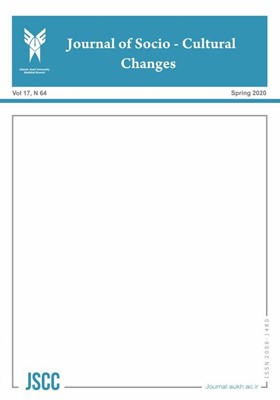The Effectiveness of Elderly on Their Social Alienation ) Case Study: Elderly of Residents in Sanatoriums of City Rasht(
Subject Areas : Family
Rahim Hojati Siboni
1
,
ail moradi
2
![]() ,
Shahla kazemipoursabat
3
*
,
Hamid pouryosefi
4
,
Shahla kazemipoursabat
3
*
,
Hamid pouryosefi
4
1 - Reasercher of Social Sciences
2 - Department of Sociology, Eslam Abad-E-Gharb Branch, Islamic Azad University, Eslam Abad-E-Gharb, Kermanshah, Iran
3 - Faculty member of Tehran university
4 - دانشیار گروه جامعه شناسی، واحد تهران شمال، دانشگاه آزاد اسلامی، تهران، ایران.
Keywords: religious identity, Social Isolation, social alienation, Keywords: Loneliness,
Abstract :
Abstract The aim of this study was to investigate the theoretical model of the relationship between aging and the dimensions of the sociological concept of their religious identity in the statistical community related to sanatoriums of Rasht, in 2019. The present study is a cross-sectional study of statistical methods based on multiple regression models. The statistical population of this study also includes elderly in the sanatoriums of Rasht, which included six sanatoriums: Maloulin, Kowsar, Shalizar, Maryam, Rangin Kaman Zandegi and Mandegar, which were managed around the clock. A total of 603 elderly people lived in those sanatoriums, of which 235 were selected based on Morgan and Chrissy sampling. After distributing the old age questionnaire, the data about the independent variables and the indicators affecting the dependent variable were collected and analyzed based on multiple regression method and path analysis. After testing the variables related to research hypotheses and using appropriate statistical methods, it was concluded that the social isolation variable had the greatest effect on the tendency of elderly people living in sanatoriums of Rasht to their social alienation and religious identity index had the least effect. Indicators of loneliness and depression were second and third. As a result, it can be stated that although elderly people living in Rasht sanatoriums were less inclined to social alienation due to their desire for solitude, depression, and ultimately social isolation, due to the profound influence of religious identity and religious beliefs in God,, they factors did not have much expansion and comprehensiveness;
_||_

